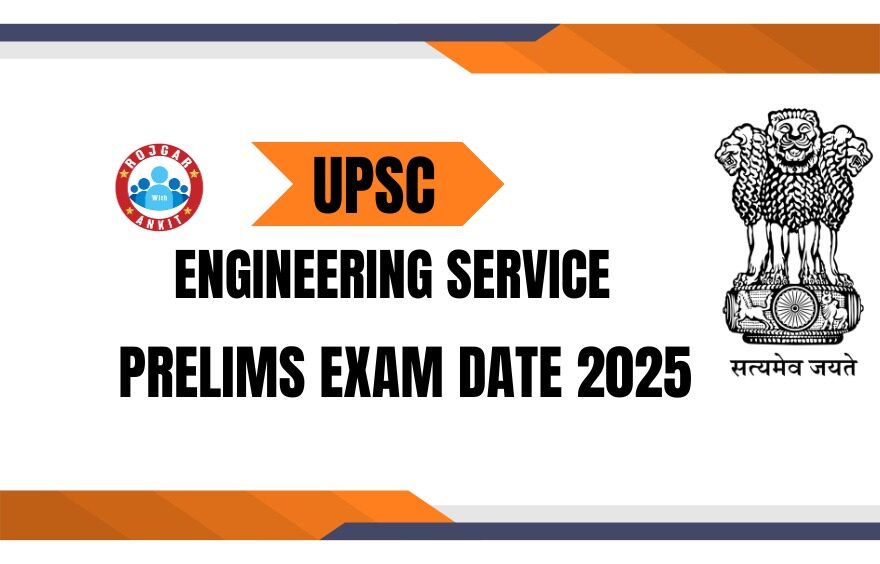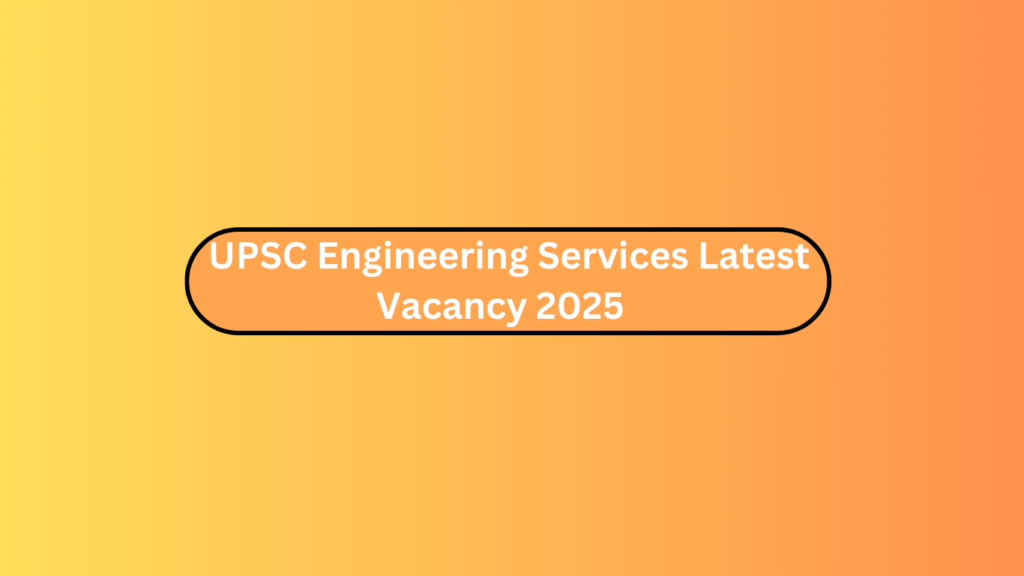The Union Public Service Commission (UPSC) has announced the Engineering Services Examination (ESE) for 2025. This is a major exam for engineering graduates who want to work in government jobs. These jobs are high-level (Group-A and Group-A/B) in different government departments.
The official announcement is Notice No. 02/2025 ENGG. The exam has three parts: Stage-I (Preliminary), Stage-II (Main), and Stage-III (Personality Test).
First is the Preliminary (Stage-I) exam, which will happen on February 9, 2025. This exam is for four types of engineering:
- Civil Engineering
- Mechanical Engineering
- Electrical Engineering
- Electronics & Telecommunication Engineering
Important Dates
| Event | Date |
| Notification Date | September 18, 2024 |
| Online Application Starts | September 18, 2024 |
| Last Date to Apply | October 8, 2024 (up to 6:00 PM) |
| Application Correction Window | October 9, 2024 to October 15, 2024 |
| Preliminary Exam Date | February 9, 2025 |
Vacancy Details
The notification says there are about 232 vacancies in total. This number might change later.
Out of these, 12 vacancies are for candidates with Benchmark Disabilities (PwBD):
- 7 vacancies for Locomotor Disability
- 5 vacancies for Hard of Hearing
Reservations for SC, ST, OBC, and EWS candidates will also be available as per government rules.
Eligibility Criteria
Education
You must have one of the following qualifications:
- A Degree in Engineering from a recognized university.
- Passed Sections A and B of the Institution Examinations of the Institution of Engineers (India).
- A Graduate Membership Examination pass from the Institution of Electronics and Telecommunication Engineers (India).
- Passed Associate Membership Examination (Parts II and III / Sections A and B) of the Aeronautical Society of India.
If you are in your final year: You can still apply. If you pass the written exams, you will need to show proof that you passed your degree before the Personality Test (interview).
Age Limit (as of January 1, 2025)
- You must be at least 21 years old.
- You must not be over 30 years old.
- This means you must be born between January 2, 1995, and January 1, 2004.
Age Relaxation
The upper age limit (30 years) can be relaxed for certain categories, meaning you can be older:
| Category | Relaxation (Added to Upper Age Limit) |
| SC / ST | 5 years |
| OBC | 3 years |
| Defence Services Personnel (disabled in operations) | 3 years |
| Ex-servicemen | 5 years |
| Persons with Benchmark Disability (PwBD) | 10 years |
How to Apply and Fee
Application Steps
- OTR: You must first register on the ‘One Time Registration’ (OTR) platform on the UPSC website (upsconline.nic.in). You only need to do this once in your lifetime.
- Fill Application: After OTR, you can fill out the online application for the exam.
- Photo ID: You will need details from a Photo ID card (like Aadhaar, Voter Card, etc.). You must also bring this same ID card to the exam.
- Photograph: You need to upload a recent photograph. It should not be more than 10 days old from the start of the application date. Your name and the date the photo was taken must be clearly written on the photograph.
Application Fee
- Cost: Rs. 200 (Rupees Two Hundred).
- How to Pay: You can pay online (Credit/Debit Card, UPI, etc.) or by cash (“Pay by cash” mode) at an SBI bank branch.
- Fee Exemption: Female candidates, SC, ST, and PwBD candidates do not have to pay any fee. (Note: OBC candidates must pay the fee).
Salary
The official notice does not list the exact salary. However, the jobs are for high-level Group-A and Group-A/B services in the Central Government, which come with good pay and benefits.
Selection process
The selection process has three parts:
- Stage-I (Preliminary Exam): This is an objective-type (multiple choice) test. It is used to select candidates for the next stage.
- Stage-II (Main Exam): This is a conventional (written, descriptive) exam. You must pass Stage-I to be eligible for this.
- Stage-III (Personality Test): This is an interview. You must pass Stage-II to be called for the interview.
Your final rank is based on your total marks from all three stages combined (Stage-I + Stage-II + Stage-III).
Exam Structure
Stage-I: Preliminary Exam (Objective Type)
| Paper | Subject | Duration | Max. Marks |
| Paper-I | General Studies and Engineering Aptitude | 2 hours | 200 |
| Paper-II | Your Engineering Subject | 3 hours | 300 |
| Total | 500 | ||
| Important: There is a penalty (Negative Marking) for wrong answers in the objective papers. One-third (1/3rd) of the marks for that question will be deducted. |
Stage-II: Main Exam (Written Type)
| Paper | Subject | Duration | Max. Marks |
| Paper-I | Your Engineering Subject (Paper 1) | 3 hours | 300 |
| Paper-II | Your Engineering Subject (Paper 2) | 3 hours | 300 |
| Total | 600 |
Stage-III: Personality Test
- The interview will have a maximum of 200 Marks.
Medical and Physical Rules
Candidates must be physically fit according to the rules. If you are recommended after the exams, you must pass a medical examination.
For PwBD candidates, the notification lists which jobs are suitable and what the physical requirements are (like S for Sitting, W for Walking, RW for Reading & Writing). You must have a disability of 40% or more to be considered for these reserved spots.
(Note: This is a medical and physical standard check, not a Physical Efficiency Test like running or jumping.)
Syllabus
The level of the exam will be similar to what you study in an engineering degree.
Stage-I: Paper-I (Common for all)
This paper is the same for all candidates and includes 10 topics. Each topic will be 5% to 15% of the total marks.
- Current issues (national and international).
- Engineering Aptitude (logical reasoning and analytical ability).
- Engineering Mathematics and Numerical Analysis.
- General Principles of Design, Drawing, and Safety.
- Standards and Quality practices.
- Basics of Energy and Environment (conservation, pollution, etc.).
- Basics of Project Management.
- Basics of Material Science and Engineering.
- Information and Communication Technologies (ICT).
- Ethics and values in the engineering profession.
Stage-I (Paper-II) and Stage-II (Papers I & II)
This is the detailed syllabus for your engineering branch. The main topics are:
- Civil Engineering:
- Paper-I Topics: Building Materials, Solid Mechanics, Structural Analysis, Design of Steel Structures, Design of Concrete and Masonry Structures, Construction Practice.
- Paper-II Topics: Fluid Mechanics, Hydrology, Environmental Engineering, Geo-technical Engineering, Surveying, Transportation Engineering.
- Mechanical Engineering:
- Paper-I Topics: Fluid Mechanics, Thermodynamics and Heat transfer, IC Engines, Refrigeration and Air conditioning, Turbo Machinery, Power Plant Engineering.
- Paper-II Topics: Engineering Mechanics, Engineering Materials, Mechanisms and Machines, Design of Machine Elements, Manufacturing, Mechatronics and Robotics.
- Electrical Engineering:
- Paper-I Topics: Engineering Mathematics, Electrical Materials, Electric Circuits and Fields, Electrical and Electronic Measurements, Computer Fundamentals.
- Paper-II Topics: Analog and Digital Electronics, Systems and Signal Processing, Control Systems, Electrical Machines, Power Systems, Power Electronics.
- Electronics & Telecommunication Engineering:
- Paper-I Topics: Basic Electronics, Basic Electrical Engineering, Materials Science, Electronic Measurements, Network Theory, Analog and Digital Circuits.
- Paper-II Topics: Communication Systems, Control Systems, Computer Organization, Electro Magnetics, Advanced Electronics, Advanced Communication.
Preparation tips
- Know the Syllabus: The full syllabus is in Section-III of the official notice.
- Focus on Paper-I: The General Studies paper is common for everyone and counts toward your final score.
- Be Careful with Guesses: Stage-I has negative marking for wrong answers.
- Practice Writing: Stage-II is a written exam, and all answers must be in English.
- Solve Old Papers: This is the best way to understand the exam’s pattern and difficulty level.
Admit Card
You will get an e-Admission Certificate online. It will be on the UPSC website (upsc.gov.in). It should be available on the last working day of the week before the exam.
No admit card will be sent by post. If you cannot download your admit card three days before the exam, you should contact the Commission’s office immediately
Result
First, the results for Stage-I will be announced to show who qualified for the Stage-II Main exam. The final result, which decides who gets the job, will be based on the total marks from all three stages (Preliminary, Main, and Personality Test).



